
My Mum recently asked my partner and I what we were doing for Christmas. I was slightly surprised to find myself announcing that I was cancelling Christmas this year. Here we were, together in late summer, celebrating my stepdad’s 70th birthday. I was more than happy to get together, to mark midwinter, to mark the passing year, maybe, but I had no desire to mark the 25th December.
The past few years I’ve celebrated Christmas less and less. I still partake in many of its rituals: card writing, cake-making, present giving, and watching my nieces in their nativity plays. But Christmas day?
I have been re-thinking Christmas for a while now. Eight years ago, I went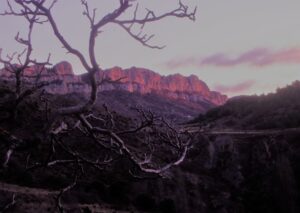 on retreat at Christmas to EcoDharma in the Catalonian Pyrenees, one of my favourite places. The centre offers courses, events, and retreats supporting the realisation of human potential and ecological consciousness within the web of life. Sitting on a huge sun- drenched rock below the Serra de Carreu-Sant Corneli one day I remembered it was Christmas. I felt fabulously uncluttered – no sign of big meals, presents, and dozing in front of films. It was quite a departure from my regular routine as it coincided with my Mum’s 70th birthday. My family celebrated early, and it was lovely calling my Mum en route to Spain, first from London, St Pancras, then standing beside a crepuscular Notre Dame in Paris, mid journey – I enjoyed having a virtual travel companion. The three trains and two buses I travelled on snaked their way from Bristol to London, London to Paris, Paris to Barcelona, Barcelona to EcoDharma.
on retreat at Christmas to EcoDharma in the Catalonian Pyrenees, one of my favourite places. The centre offers courses, events, and retreats supporting the realisation of human potential and ecological consciousness within the web of life. Sitting on a huge sun- drenched rock below the Serra de Carreu-Sant Corneli one day I remembered it was Christmas. I felt fabulously uncluttered – no sign of big meals, presents, and dozing in front of films. It was quite a departure from my regular routine as it coincided with my Mum’s 70th birthday. My family celebrated early, and it was lovely calling my Mum en route to Spain, first from London, St Pancras, then standing beside a crepuscular Notre Dame in Paris, mid journey – I enjoyed having a virtual travel companion. The three trains and two buses I travelled on snaked their way from Bristol to London, London to Paris, Paris to Barcelona, Barcelona to EcoDharma.
The end of a significant relationship in my extended family 18 months ago has also had a catalysing effect on my family and me, encouraging us to re-think how we spend Christmas. We’re finding ways of being more creative in how we spend time and not wanting to miss out seeing anyone, whilst respecting the changing dynamics.
Since I consciously decided to pay less attention to Christmas and more attention to the season itself, something has gradually been changing. I give myself more and more free rein to listen to what I want to do at midwinter and to ask others what they would like to do. I realise it’s a question and a discussion that might not happen often enough.
I hope I offer the same permissions and space to therapy clients. It is pretty common place for quite a few of my clients to feel the pressure to conform to the plans of others at this time of the year, or to maintain traditions that lost their meaning many years ago, or to feel split in figuring out how to divide their time between families, or to feel acutely alone in their unwelcome solitude, and many other difficult emotions. It can be a time of potential and actual crises.
The chance to write for this themed edition of Somatic Psychotherapy Today has usefully got me thinking about Christmas, this over-loaded midwinter festival, and how I want to spend my time now and during holidays at other times in the year, too.
What am I/we marking?
Nowadays, in the month of December, I am personally marking the midwinter and the turning of the year. I ask my body this question ‘what are we marking?’ and it tells me of the deliciousness of noticing, relishing, the short, dark days. Slowly, carefully. At this time of year, I find it so much easier to read, to write, and to stay home more. My body reminds me how invites to festive socialising create a pushing and pulling – I want to gather, to see people, to wish them well for the coming year, and at the same time I am also happy to stay home, hermit-like and to wander slowly in the quietened, dormant land, enjoying the skeletal trees and icy puddles.
I’m re-reading a book called The Real Middle Earth (Bates, 2002) and synchronicitously I came across this quote this morning:
The people of ancient England lived in a way which reflected their perception of the sun and moon, day and night. They maintained a balance between the brightness of ‘sun thinking’ and the imagination of ‘moon thinking’. The objective days were when they could ‘see what is there’ and ‘get things done’. But their lives were also informed by the intelligence of the night, the power of the imaginal, the states of mind that manifest when the constraints of a visible, material world are lifted (Bates, 2002: 127).
I strongly agree with Bates. I, too, draw parallels between summer, being, for me . . . at least, more about ‘sun thinking’ and winter about ‘moon thinking’. For me it’s a time to go inward, create, let my mind wonder, to digest, to stew, even, in readiness for the more outer productivity of the following year and the burgeoning of spring.
I want to honour nature’s going inward by doing it myself. I want to be in sync with the seasons as much as I can. This isn’t entirely possible. I would love to rise with the sun and hunker down as the light fails, except my everyday work/life timetable doesn’t permit this. At least I can try for quieter evenings, enjoying the closing of the door when I come home on a dark winter’s night.
I want to understand the depth of dormancy like the far-reaching roots of the mighty oak, my favourite native cousin. Dormant but not passive, still but very much alive. What would that feel like, in my bones? I want to learn from the other than human and more than human world, re-embodying parts of myself and my ancestors which have become culturally divorced from the air, earth, water, and all the elements and other beings. In these times of climate emergency, extinction, and other interrelated crises, it feels more urgent than ever to enter into the dormancy of winter as fully as I often enter into the full-blown action of summer. The one needs the other.
With these things in mind, and thinking again of Bate’s above quote, I find it saddening that Christmas has, for many, become constrained and filled with the stress of the visible, material world, rather than the ‘lifting’ of these constraints. The stress of consuming: presents, food, drink, experiences, get in the way of this chance of dormancy and deep reflection. When do we let our body-minds rest? How might the world be different if we did?
I want to mark this time of the year in other ways. I am not a Christian. I do not want to celebrate the birth of Christ, even though I can marvel at parts of its beauty as a story of new life. There are more Buddhists than Christians in my family; yet, there are long-standing traditions I want to uphold, many, of course, with their roots in earth-based pagan traditions that Christianity took on and often altered, sometimes beyond recognition.
I want to decorate the house, bring the light into the darkness as the year turns. I want to send cards to friends I mightn’t see from year to year – I love to send news and to receive theirs. I love that the news is often still handwritten, arriving by ‘snail mail’, which is, in itself, exciting in the age of immediate digital communication and social media. This year I shall finally get organised by designing and sending New Year rather than Christmas cards.
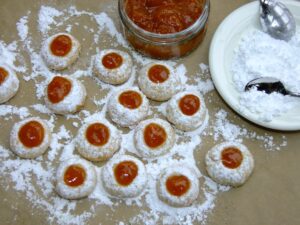 I love cooking for family and friends, so I shall continue to prepare cakes and the odd seasonal feast in the wintery gloom. Most of all I shall look forwards and back on those short days leading up to the end of the calendar year, giving thanks for what went well and being glad for the hard times passed and what was gleaned from the experience. Being a grower I am more and more acutely aware that midwinter was once the ‘hungry gap’ in the year, no doubt with some of my direct ancestors starving in these months, so I also count my blessings that I live in plentiful times and avoid waste.
I love cooking for family and friends, so I shall continue to prepare cakes and the odd seasonal feast in the wintery gloom. Most of all I shall look forwards and back on those short days leading up to the end of the calendar year, giving thanks for what went well and being glad for the hard times passed and what was gleaned from the experience. Being a grower I am more and more acutely aware that midwinter was once the ‘hungry gap’ in the year, no doubt with some of my direct ancestors starving in these months, so I also count my blessings that I live in plentiful times and avoid waste.
There’s also a part of me that finds it hard to let go of the celebrating of the Christmases of times passed. I asked to go to church when I was five and carried on going into my mid teenage years. I sang in choirs, played music for festivities, and knew carols by heart. I get withdrawal symptoms if I don’t sing some sort of Christmas song or carol; these days this is satisfied by listening to carols sung by the talented folk singer Kate Rusby, who sings the carols that were sung in the villages around her South Yorkshire home, some to well- loved carols, some to more local adaptations.
I’m still trying to figure out how remnants of my church-going past fits (or not?) with my present marking of midwinter. I found myself at midnight mass two years ago in a pretty church five minutes from home. It felt like someone else’s service and celebration, even though the people couldn’t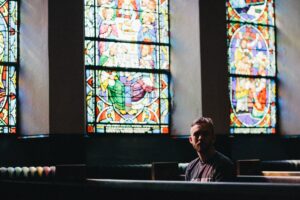 have been more welcoming, and even though the Christmas story is so familiar to me, having being part of it for years.
have been more welcoming, and even though the Christmas story is so familiar to me, having being part of it for years.
It brings home the fact I sometimes long to be practising the religion of this land. For the past 25 years I have been a practising Buddhist celebrating Christmas – once a festival of my country – that is now a largely secular place with Christmas a mainly commercialised venture.
In fact, what I long for is to practise what I imagine were the pre-Christian traditions of our land, knowing that there are times for sun and times for moon thinking. Celebrating the return of the light and warmth on May’s eve. Celebrating the harvest as the days shorten and the light turns softer and golden, remembering the thinly veiled places and beings gone before on the eve of November.
I will channel this longing into creating what happens now, individually and collectively in how I/we, my people, celebrate the turning of this year, rather than harking back to times past, which can rather easily descend into over- 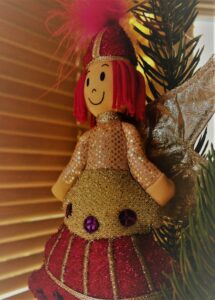 romanticising and nostalgia. Nostalgia rarely ends well for me, especially at this time of the year, and it’s always a relief when I re-realise that nostalgia can be born of what I wanted to happen which never did actually happen when I was a child,- a form of grief for what might have been.
romanticising and nostalgia. Nostalgia rarely ends well for me, especially at this time of the year, and it’s always a relief when I re-realise that nostalgia can be born of what I wanted to happen which never did actually happen when I was a child,- a form of grief for what might have been.
A year or two back I wrote a blog piece entitled Reclaiming the Midwinter. I want to continue to reclaim the midwinter in how I live and take a step further. I want to encourage that in others. Nowadays, rather than miss the moment in nostalgia I hope to pay attention to traditions as live practice and to encourage others to do the same listening carefully to how our individual and collective practices honour ourselves, our families, and friends, as well as, equally importantly, the other than and more than human life around us. Being curious about what might emerge in the quiet dormancy as well as the heart of connection. I am quietly excited, knowing that nothing’s set in stone.
However you spend this midwinter, I wish you all that you wish for, and peace and creativity for all of us and the way we relate to one another and the planet in 2020!
Reference:
Bates, B. (2002). The real middle earth: Magic and mystery in the Dark Ages. London: Pan Books.
Information about the music of Kate Rusby: https://katerusby.com/
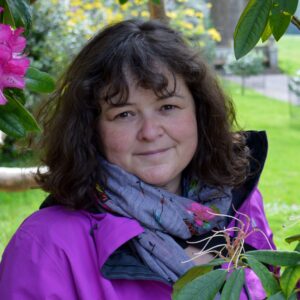 Emma Palmer is a relational body psychotherapist, ecopsychologist, supervisor, and writer. Practising as a therapist since 2003, she is engaged in using therapy skills and contemplative practices in helping to face the realities of climate emergency, our disconnection from nature, and in building more creative, reflective and resilient communities.
Emma Palmer is a relational body psychotherapist, ecopsychologist, supervisor, and writer. Practising as a therapist since 2003, she is engaged in using therapy skills and contemplative practices in helping to face the realities of climate emergency, our disconnection from nature, and in building more creative, reflective and resilient communities.
Previously a steering group member of Psychotherapist and Counsellors for Social Responsibility, and editor of its Transformations journal, Emma is also a member of the Climate Psychology Alliance.
Author of several journal articles, she has written three books: Meditating with Character, Other than Mother:Choosing Childlessness with Life in Mind, and Bodywise. Her fourth, a co-editted collection written by therapists in the wake of the #MeToo movement will be published by PCCS Books in 2020. She has been a regular writer for Somatic Psychotherapy Today since 2012.
For 25 years she has worked as a facilitator, from teaching postgraduate international development studies at Bristol University, to working with NGOs in sub-Saharan Africa, offering Wild therapy, and leading retreats – she has been a practicing Buddhist since 1995.







